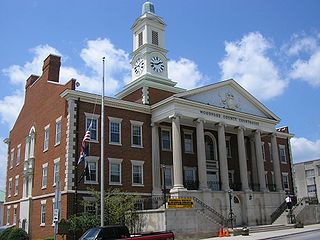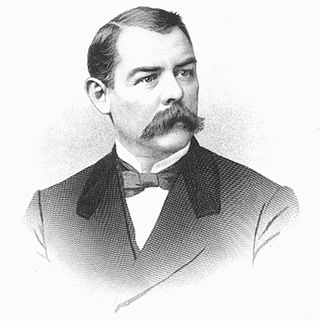Related Research Articles

Woodford County is a county located in the U.S. state of Kentucky. As of the 2020 census, the population was 26,871. Its county seat is Versailles. The area was home to Pisgah Academy. Woodford County is part of the Lexington-Fayette, KY Metropolitan Statistical Area. It is located in the center of the Bluegrass region of Kentucky.

John Hanks Alexander was the first African-American officer in the United States armed forces to hold a regular command position and the second African-American graduate of the United States Military Academy.

Joan Violet Robinson was a British economist known for her wide-ranging contributions to economic theory. One of the most prominent economists of the century, Joan Robinson incarnated the "Cambridge School" in most of its guises in the 20th century. She started out as a Marshallian; became, after 1936, one of the earliest and most ardent Keynesians; and ended up as a leader of the Neo-Ricardian and Post-Keynesian schools.

Ohio Wesleyan University (OWU) is a private liberal arts college in Delaware, Ohio. It was founded in 1842 by Methodist leaders and Central Ohio residents as a nonsectarian institution, and is a member of the Ohio Five – a consortium of Ohio liberal arts colleges.

John Stoughton Newberry was an American industrialist and politician. He served as the first provost marshal for the State of Michigan and as a U.S. Representative from the state of Michigan.

Albion Winegar Tourgée was an American soldier, lawyer, writer, politician, and diplomat. Wounded in the Civil War, he relocated to North Carolina afterward, where he became involved in Reconstruction activities. He served in the constitutional convention and later in the state legislature. A pioneer civil rights activist, he founded the National Citizens' Rights Association, and founded Bennett College as a normal school for freedmen in North Carolina.

Green Lawn Cemetery is an active historic private rural cemetery located in Columbus, Ohio, in the United States. Organized in 1848 and opened in 1849, the cemetery was the city's premier burying ground in the 1800s and beyond. An American Civil War memorial was erected there in 1891, and chapel constructed in 1902. With 360 acres (150 ha), it is Ohio's second-largest cemetery.

James Robinson Graves was an American Baptist preacher, publisher, evangelist, debater, author, and editor. He is most noted as the original founder of what is now the Southwestern family of companies. Graves was born in Chester, Vermont, the son of Z. C. Graves, and died in Memphis, Tennessee. His remains are interred in Elmwood Cemetery in Memphis.

Frederic Ward Putnam was an American anthropologist and biologist.

James Biddle Eustis was a United States senator from Louisiana who served as President Cleveland's ambassador to France.

Daniel Drake was a pioneering American physician and prolific writer.
George Brant Bridgman was a Canadian-American painter, writer, and teacher in the fields of anatomy and figure drawing. Bridgman taught anatomy for artists at the Art Students League of New York for some 45 years.
John McClure Wiley was a U.S. Representative from New York.

John Rockey Park was a prominent educator in the Territory and State of Utah in the late 19th century, and in many ways was the intellectual father of the University of Utah.

Ezekiel Gilman Robinson was an American Baptist clergyman, theologian and educator, born at Attleboro, Massachusetts, and educated at Brown University and at Newton Theological Institution. He preached at Norfolk, Virginia, and at Cambridge, Massachusetts, was professor of Hebrew and biblical interpretation in the Western Theological Seminary, and in 1849 accepted a call to a church in Cincinnati, Ohio. Three years later he was appointed professor of theology in Rochester Theological Seminary and in 1868 was made its president. From 1872 to 1889 he was president of Brown University, and from 1893 to his death he occupied the chair of ethics and apologetics at the University of Chicago. He edited the Christian Review from 1859 to 1864.

Adelia Cleopatra Graves was an American educator, author, and poet. At one time serving as Professor of Latin and Belles-lettres at Mary Sharp College, she went on to occupy the position of Matron and Professor of Rhetoric in the college. In 1841, she married Prof. Zuinglius Calvin Graves (1816–1902), who was serving as president of Kingsville Academy. She was the author of several books including juvenile literature under the pseudonym of "Aunt Alice". She also contributed prose and verse to periodical literature. In her day, Graves was one of the most popular writers of the South. Her best-known works were: Life of Columbus; Poems for Children; Seclusarval, or the Arts of Romanism; and Jephtha's Daughter, a drama.

Allenswood Boarding Academy was an exclusive girls' boarding school founded in Wimbledon, London, by Marie Souvestre in 1883 and operated until the early 1950s, when it was demolished and replaced with a housing development.
Zuinglius Calvin Graves was an American Baptist preacher and educator. He is most noted as the first President of the Mary Sharp College (1851–1896), located at Winchester, Tennessee. It was the first women's college in the United States to offer degrees equivalent to the degrees offered at men's colleges – preceding Vassar College by ten years.
References
- ↑ Quackenbush, Jannette Rae (2014). Ohio Ghost Hunter Guide VI. 21 Crows Dusk to Dawn Publishing. pp. 37–39. ISBN 978-1940087092 . Retrieved October 30, 2016.
- ↑ "Archived copy". Archived from the original on 2016-03-04. Retrieved 2014-05-29.
{{cite web}}: CS1 maint: archived copy as title (link) - ↑ Moon, Debra (2003). Chico: Life and Times of a City of Fortune. Arcadia Publishing. p. 20. ISBN 0738524468 . Retrieved October 30, 2016.
- ↑ Capace, Nancy (2000). Encyclopedia of Vermont. Somerset Publishers. p. 142. ISBN 0403096022 . Retrieved October 30, 2016.
- ↑ Hannan, Caryn (1998). Michigan Biographical Dictionary. State History Publications. p. 112. ISBN 1878592955 . Retrieved October 30, 2016.
- 1 2 Biographical Directory of the United States Congress, 1774-2005. Government Printing Office. 2005. pp. 751–1662. ISBN 0160731763 . Retrieved October 30, 2016.
- ↑ Patterson, James (2012). James Robinson Graves: Staking the Boundaries of Baptist Identity. LifeWay Christian Resources. p. 22. ISBN 9781433671661 . Retrieved October 30, 2016.
- ↑ Gross, Theodore L. (1959). Albion W. Tourgée: Critic of Society. Ardent Media. p. 18. Retrieved October 30, 2016.
- ↑ Zuczek, Richard (2006). Encyclopedia of the Reconstruction Era: M-Z and primary documents, Volume 2. Greenwood Publishing Group. p. 659. ISBN 0313330751 . Retrieved October 30, 2016.